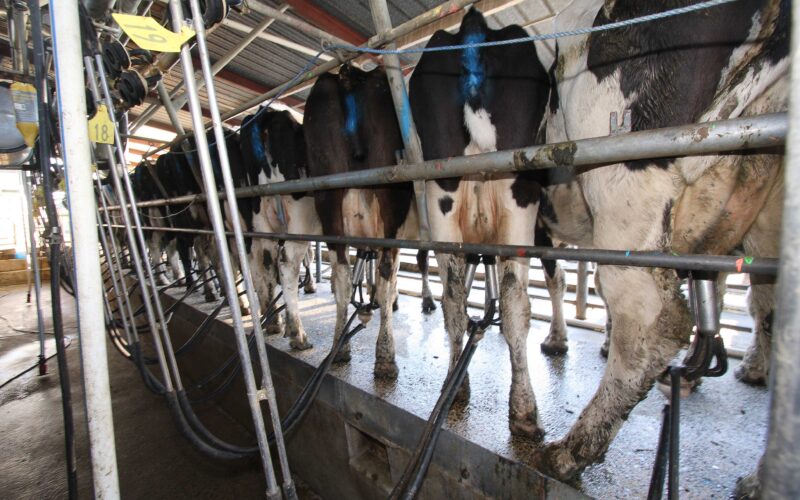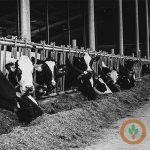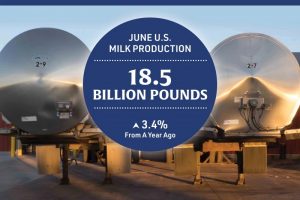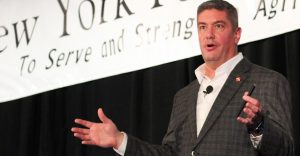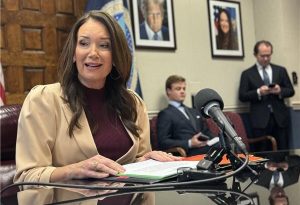
JUANA SUMMERS, HOST:
Genetic fragments of bird flu were found in the country’s milk supply last month. To be clear, pasteurized milk remains safe to drink, but it does mean avian flu is spreading among cows. This week, the federal government required more testing of herds. NPR’s Yuki Noguchi reports.
YUKI NOGUCHI, BYLINE: Eric Weaver raises, tends and milks 200 cows in Lancaster County, the tenth-generation farmer to work land bestowed on his family by the founder of Pennsylvania himself.
ERIC WEAVER: Yeah, my ancestors would have gotten this piece of land from William Penn, actually.
NOGUCHI: The work is in his blood.
WEAVER: I just enjoy seeing cattle do well, seeing them perform well.
NOGUCHI: But Weaver isn’t sure what to make of avian flu. Federal officials confirmed cases in 34 herds across nine states so far, though not in Pennsylvania. Experts say it’s likely spread far beyond that because cattle crisscross the country in the course of production. On Monday, the U.S. Department of Agriculture began requiring every dairy herd to test before crossing state borders. Weaver says, unlike many other farms, his cows don’t mingle with others, something he hopes will protect them from infection.
WEAVER: We’re not buying in cattle, so it – that’s something that helps reduce new diseases coming onto the farm potentially, but this disease sounds like it’s passing from farm to farm easier.
NOGUCHI: Much is unknown about this disease. Although, again, food safety experts say milk is still safe thanks to pasteurization. Fragments of virus are not contagious or dangerous.
ALEXIS THOMPSON: When we say we’re very confident in our milk supply, that’s part of it.
NOGUCHI: Alexis Thompson studies cow diseases at Texas A&M Veterinary Diagnostic Lab. She says, by law, milk from sick cows is thrown out, but…
THOMPSON: You have to be identified as being sick, though.
NOGUCHI: And that’s Thompson’s worry. There’s been too little testing.
THOMPSON: We don’t know how many animals have this. That testing has not been done.
NOGUCHI: So far, only lactating cows seem to get infected, and none have died. But as happened with COVID -19, viruses can mutate, becoming more infectious or deadly. Thompson says dairy farmers are in a tough spot. They helped identify this disease in cows in the first place, but now testing or cooperating with officials comes with a risk of stigma and serious business disruption.
THOMPSON: It’s very scary if you say you want people to come onto your operation because you don’t know how that is going to disrupt your livelihood. They have been very understanding. They have been very helpful. They want to have answers, too. But at the end of the day, most of them are footing the bill.
NOGUCHI: This, she says, is where public health must contend with the realities for the 28,000 or so commercial milk producers in the country. The USDA acknowledged this at a press conference last week.
(SOUNDBITE OF ARCHIVED RECORDING)
ROSEMARY SIFFORD: We are trying to address, again, what we hear as anecdotal reluctance by just…
NOGUCHI: Deputy administrator Rosemary Sifford said, USDA is assuring farmers its goal is preventing future deadlier disease. But outside of that, there’s no financial incentive. Keith Poulsen directs the Wisconsin Veterinary Diagnostic Laboratory.
KEITH POULSEN: This is a pandemic-potential virus. I don’t want to have a doomsday scenario here, but we know that flu changes. We think that’s a very low but nonzero risk, but the longer that it’s not managed appropriately on the farms, that potential goes up.
NOGUCHI: And, he says, poultry and pig farms have similar concerns.
Yuki Noguchi, NPR News.
(SOUNDBITE OF LILY MOORE SONG, “BEAUTIFUL LIE”) Transcript provided by NPR, Copyright NPR.
NPR transcripts are created on a rush deadline by an NPR contractor. This text may not be in its final form and may be updated or revised in the future. Accuracy and availability may vary. The authoritative record of NPR’s programming is the audio record.
You can now read the most important #news on #eDairyNews #Whatsapp channels!!!
🇺🇸 eDairy News INGLÊS: https://whatsapp.com/channel/0029VaKsjzGDTkJyIN6hcP1K
